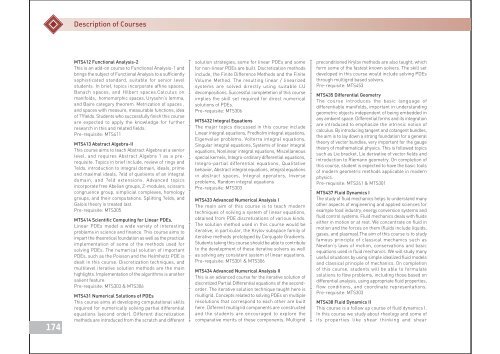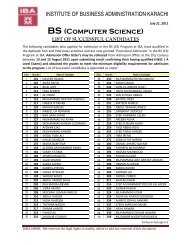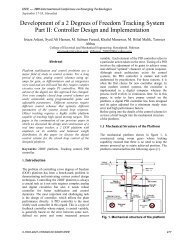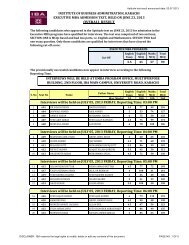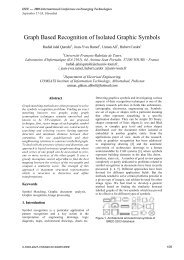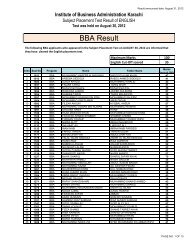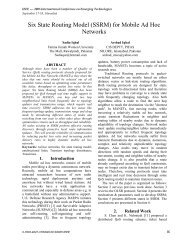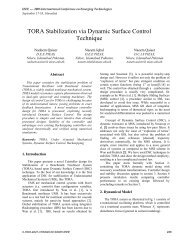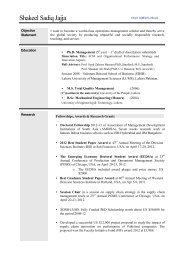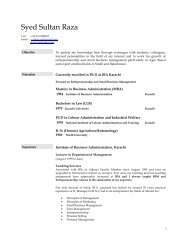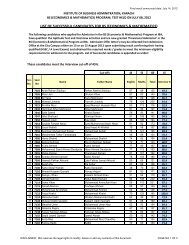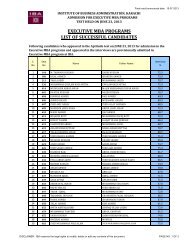Program Announcement 2013 - 14 - Institute of Business ...
Program Announcement 2013 - 14 - Institute of Business ...
Program Announcement 2013 - 14 - Institute of Business ...
You also want an ePaper? Increase the reach of your titles
YUMPU automatically turns print PDFs into web optimized ePapers that Google loves.
Description <strong>of</strong> Courses174MTS412 Functional Analysis-2This is an add-on course to Functional Analysis-1 andbrings the subject <strong>of</strong> Functional Analysis to a sufficientlysophisticated standard, suitable for senior levelstudents. In brief, topics incorporate affine spaces,Banach spaces, and Hilbert spaces.Calculus onmanifolds, homomorphic spaces, Urysohn's lemma,and Baire category theorem. Metrization <strong>of</strong> spaces ,and spaces with measure, measurable functions, idea<strong>of</strong> ??fields. Students who successfully finish this courseare expected to apply the knowledge for furtherresearch in this and related fields.Pre-requisite: MTS411MTS413 Abstract Algebra-IIThis course aims to teach Abstract Algebra at a seniorlevel, and requires Abstract Algebra 1 as a prerequisite.Topics in brief include, review <strong>of</strong> rings and?elds, introduction to integral domain, ideals, primeand maximal ideals, ?eld <strong>of</strong> quotients <strong>of</strong> an integraldomain, and ?eld extensions. Advanced topicsincorporate free Abelian groups, Z-modules, scissorscongruence group, simplicial complexes, homologygroups, and their computations. Splitting ?elds, andGalois theory is treated last.Pre-requisite: MTS305MTS4<strong>14</strong> Scientific Computing for Linear PDEs.Linear PDEs model a wide variety <strong>of</strong> interestingproblems in science and finance. This course aims toimpart the theoretical foundation as well as the practicalimplementation <strong>of</strong> some <strong>of</strong> the methods used forsolving PDEs. The numerical solution <strong>of</strong> importantPDEs, such as the Poisson and the Helmholtz PDE isdealt in this course. Discretization techniques, andmultilevel iterative solution methods are the mainhighlights. Implementation <strong>of</strong> the algorithms is anothersalient feature.Pre-requisite: MTS303 & MTS306MTS431 Numerical Solutions <strong>of</strong> PDEsThis course aims at developing computational skillsrequired for numerically solving partial differentialequations (second order). Different discretizationmethods are introduced from the scratch and differentsolution strategies, some for linear PDEs and somefor non-linear PDEs are built. Discretization methodsinclude, the Finite Difference Methods and the FiniteVolume Method. The resulting linear / linearizedsystems are solved directly using suitable LUdecompositions. Successful completetion <strong>of</strong> this courseimplies the skill set required for direct numericalsolutions <strong>of</strong> PDEs.Pre-requisite: MTS306MTS432 Integral EquationsThe major topics discussed in this course includeLinear integral equations, Fredholm integral equations,Eigenvalue problems, Volterra integral equations,Singular integral equations, Systems <strong>of</strong> linear integralequations, Nonlinear integral equations, Miscellaneousspecial kernels, Integro-ordinary differential equations,Integro-partial differential equations, Qualitativebehavior, Abstract integral equations, integral equationsin abstract spaces, Integral operators, Inverseproblems, Random integral equationsPre-requisite: MTS303MTS433 Advanced Numerical Analysis IThe main aim <strong>of</strong> this course is to teach moderntechniques <strong>of</strong> solving a system <strong>of</strong> linear equations,obtained from PDE discretizations <strong>of</strong> various kinds.The solution method used in this course would beiterative, in particular, the Krylov subspace family <strong>of</strong>iterative methods prototyped by Conjugate Gradients.Students taking this course should be able to contributeto the development <strong>of</strong> these iterative solvers as wellas solving any consistent system <strong>of</strong> linear equations.Pre-requisite: MTS301 & MTS306MTS434 Advanced Numerical Analysis IIThis is an advanced course for the iterative solution <strong>of</strong>discretized Partial Differential equations <strong>of</strong> the secondorder.The iterative solution technique taught here ismultigrid. Concepts related to solving PDEs on multipleresolutions that correspond to each other are builthere. Different multigrid components are constructedand the students are encouraged to explore thecomparative merits <strong>of</strong> these components. Multigridpreconditioned Krylov methods are also taught, whichform some <strong>of</strong> the fastest known solvers. The skill setdeveloped in this course would include solving PDEsthrough multigrid based solvers.Pre-requisite: MTS453MTS435 Differential GeometryThe course introduces the basic language <strong>of</strong>differentiable manifolds, important in understandinggeometric objects independent <strong>of</strong> being embedded inany ambient space. Differential forms and its integrationare introduced to emphasize the intrinsic notion <strong>of</strong>calculus. By introducing tangent and cotangent bundles,the aim is to lay down a strong foundation for a generaltheory <strong>of</strong> vector bundles, very important for the gaugetheory <strong>of</strong> mathematical physics. This is followed topicssuch as Lie bracket, Lie derivative <strong>of</strong> vector fields andintroduction to Riemann geometry. On completion <strong>of</strong>this course, student is expected to have the basic tools<strong>of</strong> modern geometric methods applicable in modernphysics.Pre-requisite: MTS241 & MTS301MTS437 Fluid Dynamics IThe study <strong>of</strong> fluid mechanics helps to understand manyother aspects <strong>of</strong> engineering and applied sciences forexample food industry, energy conversion systems andfluid control systems. Fluid mechanics deals with fluidseither in motion or at rest. We concentrate on fluid inmotion and the forces on them (fluids include liquids,gases, and plasmas).The aim <strong>of</strong> this course is to studyfamous principle <strong>of</strong> classical mechanics such asNewton's laws <strong>of</strong> motion, conservations and basicequations used in fluid mechanics. We will study manyuseful situations by using simple idealized fluid modelsand classical principle <strong>of</strong> mechanics. On completion<strong>of</strong> this course, students will be able to formulatesolutions to flow problems, including those based ondifferential analysis, using appropriate fluid properties,flow conditions, and coordinate representations.Pre-requisite: MTS303MTS438 Fluid Dynamics IIThis course is a follow up course <strong>of</strong> fluid dynamics I.In this course we study about rheology and some <strong>of</strong>its properties like shear thinking and shear


